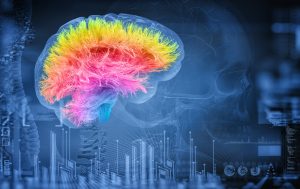
By adike at Shutterstock
Your cerebral cortex is a thin layer of brain matter covering the outer portion of the cerebrum. The cerebral cortex typically ranges from 1.5mm to 5mm, so it’s quite small. As a result, it is easily damaged by trauma.
Despite its thin nature, the cerebral cortex is also the most developed portion of the brain. It’s directly responsible for thinking, perceiving, producing and understanding language, as well as processing information around you. When damaged, these functions can be hindered. The extent of that damage, however, is based on the type of trauma and how severe it is.
Cerebral Cortex Disorders
There are a number of disorders that result from direct damage or death of brain cells within the cerebral cortex. The disorders’ symptoms vary depending on which area is damaged. There are four primary areas: the frontal lobes, parietal lobes, temporal lobes, and occipital lobes.
Let’s begin with apraxia, which is one of the most common disorders stemming from cerebral cortex damage. Apraxia is actually a group of disorders characterized by the inability to perform specific motor functions. Individuals suffering from apraxia may have difficulty walking, dressing, and using common objects as they used to.
The next most common type of disorder caused by a damaged cerebral cortex is ataxia. Ataxia is characterized by a distinct lack of coordination and balance. Patients may suffer from involuntary muscle movements or a loss of muscle control in portions of their body.
Furthermore, injuries to the cerebral cortex are often linked to depressive disorders, poor decision making, a complete lack of impulse control, and memory or attention problems.
Cerebral Cortex Trauma Symptoms
Following severe trauma to the cerebral cortex, numerous symptoms may present themselves. These symptoms include, but not are limited to, the following:
- Difficulty in planning basic tasks, such as making a cup of coffee or restocking toilet paper.
- Apathy or a complete loss of interest in life.
- Loss of thinking flexibility.
- Difficulty focusing or a complete lack of attention.
- Difficulty speaking in social settings.
- Often repeating actions without any awareness of doing so.
- Mood swings or complete loss of inhibition (may lead to offensive outbursts or inappropriate behavior).
- Weakness along one side of the face or body.
- Difficulty walking properly.
- Disorders such as ADHD, schizophrenia, or bipolar disorder.
If you or a loved one suffer from recent trauma to the cerebral cortex, seek medical attention immediately. Any signs of common symptoms or disorders should be addressed by a medical professional promptly to begin treatment.
For support during this difficult time, turn to TryMunity’s community. We provide a forum to interact with other trauma patients and family members, as well as numerous informative resources for living with traumatic brain injuries.



